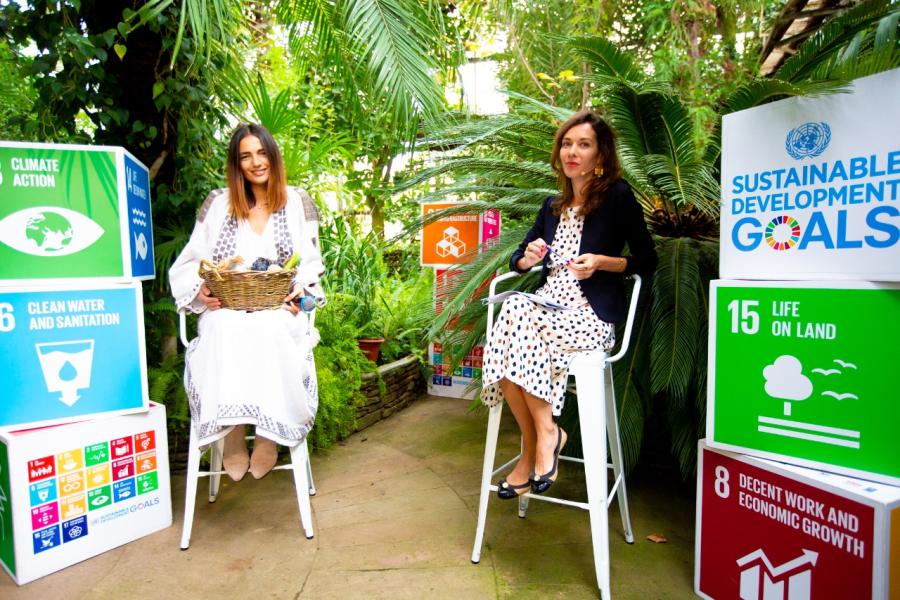GOING GREEN – the subject of the Social Good Summit 2020 edition
02 October 2020
An ecological lifestyle, without environmentally harmful waste is not a trend or a marketing strategy, it is a necessity. The COVID-19 pandemic has imposed a reassessment of our lifestyles and fundamentals of our economies. The “going green” trend, literally and metaphorically, for a cleaner air, an environment free of garbage and a durable and healthy development is embraced by more and more people worldwide. All these subjects were tackled at the Social Good Summit 2020, organized in Chișinău by the United Nations Development Programme (UNDP) and Green City Lab.

“This edition of the Social Good Summit is dedicated to starting to build forward greener, not when the pandemic will fade away, but as it still unfolds. And we are lucky to have with us remarkable people who have started this already and are willing to share their journeys. At UNDP Moldova, we have also been through many changes and adaptations, but we have not stopped to envision a greener and better environment for both rural and urban Moldova,” noted in her opening speech Dima Al-Khatib, UNDP Resident Representative for the Republic of Moldova.
Social involvement, leading by example, an ecologic lifestyle and an environmentally friendly way of conducting business were the subjects covered by the speakers at the Social Good Summit 2020.
Lilia Ojovan, followed by hundreds of thousands of people on social media, is a zero-waste promoter who opened a shop in order to make eco friendly products available to everyone: “We must educate the public. When I talked to my friends about our business idea, they told us not to do it, that it will be very hard. They knew that Moldova is not prepared for something like this, but we told ourselves that we must do it. I already had my community on social media. I had the first bamboo straws brought from Bali. And when I saw that women want them and ask about them, I told myself: why not have this process closer?! Today, everyone is thinking about the financial aspect of the business, but it is also important how it changes our society,” says Lilia Ojovan.
After the hectic city life, moving to the countryside, renovating an old house is a challenge taken by Anna Smolnițchi, blogger, copywriter and mother of two little girls. She bought an old house which she prepares to become the future home of her family. Country life represents going back to the roots, Anna believes: “I am saddened that we abandon our villages, that we don’t see development opportunities. The real life is there. We have become so estranged from our roots, from what we are, from our essence. We, the people, don’t need exhaust fumes, noise, sound pollution. We need quiet, and therefore we went to the village. This is what we sought. The quarantine period was a gift. We have confirmed to ourselves that we are very happy in our family, in our tranquillity, in our routine. We understood that we would gladly move to the countryside. In July we bought a small old house, in Râșcova village, Criuleni”.
Businesses were the most affected during the pandemic, but this didn’t stop Igor Hâncu, EduJoc founder, to adapt and to start producing plastic protective screens for frontline doctors. “At the beginning of the pandemic we were paralyzed. We decided to redirect our energy, enthusiasm and passion towards helping doctors. Therefore, together with the Association of Creative Industry Companies, we participated in the largest national movement Viziere.md. Even though we produced all this plastic, and this thought bothers me, we succeeded in offering equipment and safety to our doctors. We believe that we managed to decrease the infection rate among medical personnel since we got involved in this beautiful adventure”.
HoReCa entrepreneurs have a particular responsibility in durable development. Anna Sîtnic, Rozmarin founder and Illegal Waffles co-founder, talked about the principles of a durable business and educating the public: “We want to be an example. We want to be solidary with other venues in this matter. For this reason, we also have campaigns for promoting seasonal ingredients. We want to stimulate the consumer to bring their own recipients, this is why we offer discounts to the ones coming with reusable coffee cups or lunch boxes. Everything leads to the consumers as well, who must ask themselves when entering a restaurant: how does this place organize their business? And when we will start asking ourselves these questions more often, that’s when we will make a difference”.
Bicycle was chosen as a healthy, ecological and fast transportation means by the civil activist and public policies consultant Rodion Gavriloi. He believes that the bicycle is not only a means for weekend leisure time, but also a necessary transportation means in the urbanisation conditions. “More and more people try to buy cars, which become cheaper and cheaper. The city cannot ensure parking spaces for each of its inhabitants. It is not possible. The city will be transformed into a huge parking lot. We need to develop alternative transportation: trolleybuses, buses and bicycles, scooters or choosing to walk. The bicycle is not just something fun, it is a means of transportation. I wish for more bike lanes for bicycles and scooters”.
Gabriel Mărgineanu, President of the “BIOTICA” Ecologic Society, talked about the collective responsibility in enriching our forest fund. Planting a tree is the simplest action a person can make for a cleaner air. “Let’s ask people if we need to plant trees. Do we need forests? Cleaner air? Every single one will answer ‘yes’. When we will have the certainty and be more aware that we must plant, it’s then when we will ask ourselves: what am I doing for this? It is necessary to participate at different planting activities”.
Starting with 2009, Social Good Summit takes place in dozens of countries simultaneously, during September-October, when the world leaders gather at the General Assembly of the United Nations Organization in order to discuss the global problems and their solutions.
Recognizing that the voices and the ideas of the citizens, connected through social networks and technologies, can become a force of change, UNDP extends its UN global dialogue with innovators, activists and entrepreneurs worldwide.




